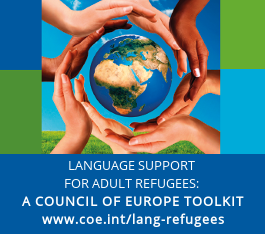How the toolkit was developed
Refugees and people in a refugee-like situation need support to acquire at least an initial language “survival” kit, along with encouragement to exploit their existing linguistic repertoire, whether for their own needs or to interpret for others.
Normal classroom teaching may be impossible. In these circumstances, NGOs or other associations working with volunteers may be responsible for providing language support for refugees. The Council of Europe therefore decided to develop a toolkit to assist this work.
A call for proposals to develop toolkit elements was published on the LIAM website in January 2016. As a result of this process, seven institutions and individuals contributed 120 items.These were analysed, revised and re-organised over a period of several months and the final selection of 57 tools was made by the LIAM co-ordinating group (see section Toolkit contributors).



